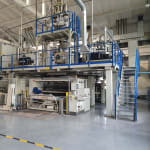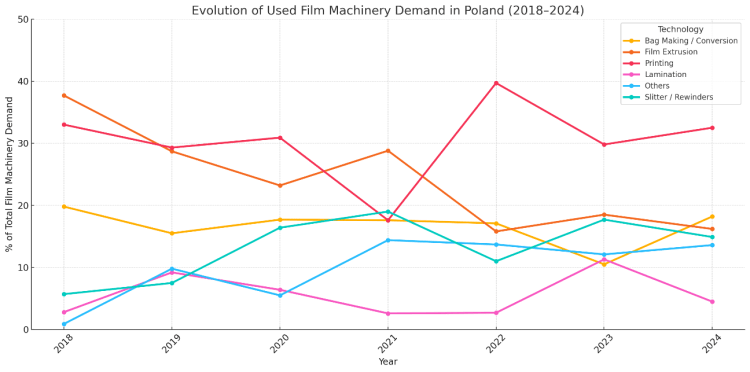
At a time when the European plastics industry is seeking to modernize, reduce costs, and move toward more sustainable models, used machinery has gained unprecedented prominence. Poland has emerged as one of the driving forces behind this transformation in Europe, with growing demand for used equipment and a notable capacity for exporting second-hand machinery.
In this context, MachinePoint has established itself as the trusted intermediary connecting the supply and demand of used machinery in Poland with the rest of the world. Thanks to its international network, comprehensive services, and local team, the company enables secure, efficient transactions that align with the new demands of the market.
The dynamism of Poland’s industrial ecosystem, combined with MachinePoint’s expertise, is driving a new phase in the used machinery trade, crucial for the sector’s competitiveness and sustainability.
Poland's used film machinery market diversifies: Which technologies are leading?
Poland’s used plastic film machinery market is showing increasing diversification, with extrusion, converting, and printing technologies taking center stage. This growth is driven by the expansion of flexible packaging, sustainability requirements, and the rise of e-commerce.
Among the most in-demand technologies are blown film extrusion lines, essential for producing bags, agricultural film, and flexible packaging. Film extrusion - covering technologies such as blown film and cast film - has seen its share of demand drop from 38% in 2018 to 16% in 2024. This does not indicate a loss of interest but rather reflects the growing variety of market needs.
At the same time, film printing machinery (including flexography, rotogravure, tape printing, etc.) has steadily gained ground, reaching 33% of demand in 2024. This growth signals a clear interest among Polish converters in customization and value-added technologies for flexible packaging. Also noteworthy is the stability of the converting and bag-making segment, which has maintained a steady share of around 18%, supported by high demand for formats such as pouch bags, industrial sacks, and bottom-sealed bags.
Although lamination has shown more volatile behavior, with peaks of interest in 2019 and 2023, it remains a relevant technology in strategies aimed at differentiation and technical performance improvement.

Poland’s used film machinery market shows a strong preference for well-established European brands. Manufacturers such as Windmöller & Hölscher, Macchi, Bandera, and Reifenhäuser demonstrate their leading position in blown film extrusion lines, while others like SML and Colines maintain a steady presence in cast film lines. Year-over-year trends indicate that these brands have sustained consistent demand despite the sector’s growing technological diversification, solidifying their status as reliable choices for Polish companies in the flexible packaging industry.
The role of used machinery in the circular economy
Today, sustainability and resource efficiency are top priorities, making used machinery a key element of the circular economy. MachinePoint has strongly embraced this model, enabling companies to optimize their production lines through the reuse of high-quality equipment.
In countries like Poland, this approach is being reinforced by public policies that offer subsidies to companies purchasing new machinery as part of their transition strategies toward circular models. This financial support is driving the sale of older equipment, creating a key opportunity for the used machinery market. It is precisely at this point that MachinePoint plays a strategic role, connecting the supply generated by these upgrades with companies looking for cost-effective and sustainable solutions.
One particularly relevant area in this process is plastic recycling, where MachinePoint offers a wide range of used equipment, from recycling lines to shredders and extruders, helping close the material life cycle and reduce the need for new raw materials.
Repelletizing lines remain at the core of recycling demand in Poland, although their market share has decreased from 55% in 2018 to 40% in 2024, as the market diversifies toward earlier stages in the recycling process.




